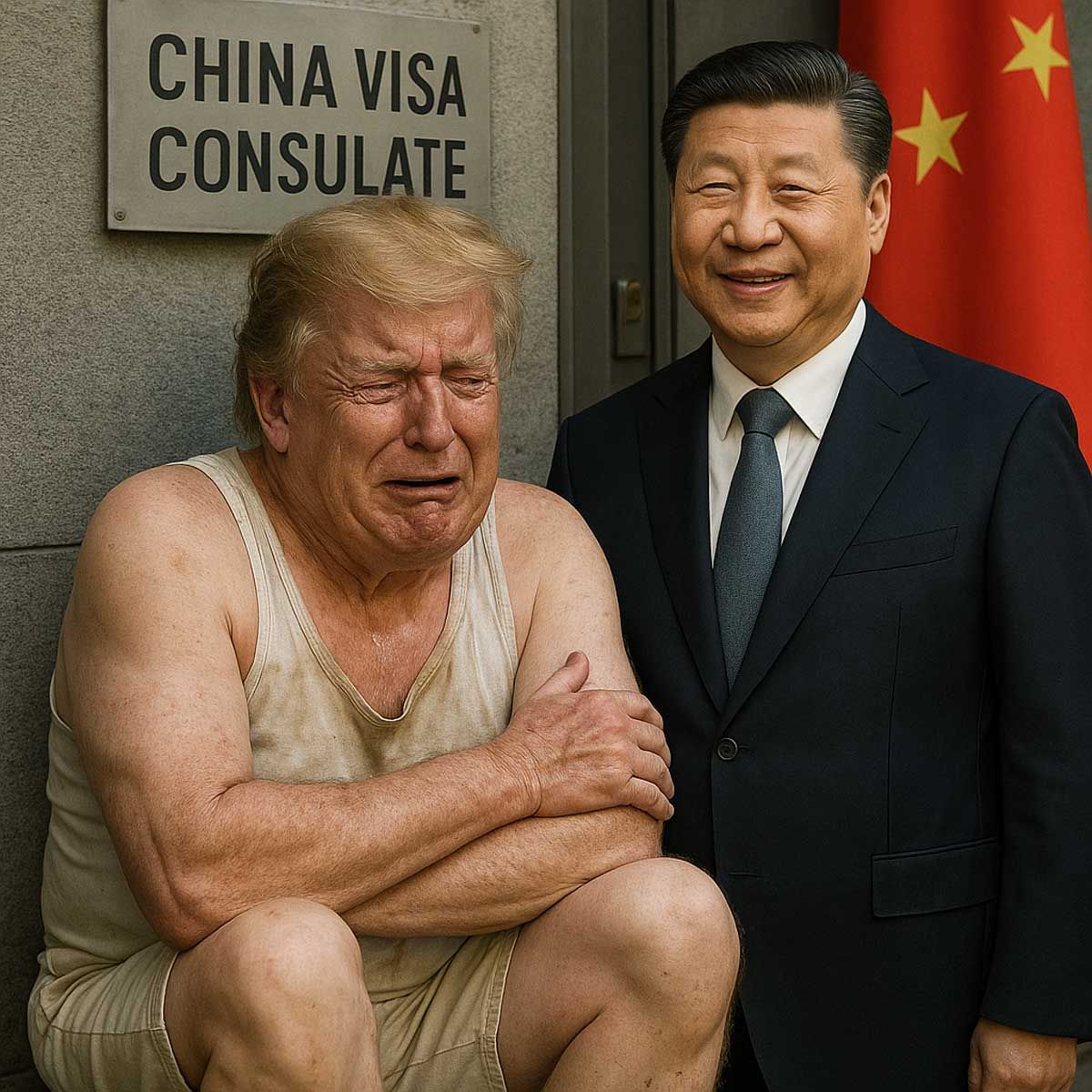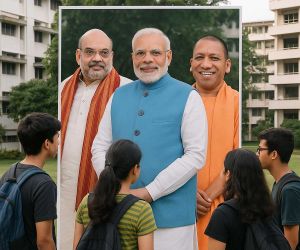MORE COVERAGE
Twitter Coverage
Satyaagrah
Written on
Satyaagrah
Written on
Satyaagrah
Written on
Satyaagrah
Written on
Satyaagrah
Written on
JOIN SATYAAGRAH SOCIAL MEDIA
Donald Trump burdens H-1B hopefuls with a $100000 fee to appease MAGA politics while China, under Li Qiang’s K Visa 2025, proudly welcomes global STEM talent with open arms

On 19th September 2025, a significant shift in U.S. immigration policy took place when President Donald Trump signed a proclamation titled Restriction on Entry of Certain Non-immigrant Workers. According to this new directive, a mandatory payment of US $1,00,000 will be imposed on all new H-1B visa petitions filed by foreign nationals residing outside the United States.
|
This move is seen as part of Trump’s continued effort to appease his core “Make America Great Again” (MAGA) supporters by tightening access to America’s labor market.
However, while the U.S. is making it tougher for international professionals, other countries are seizing the opportunity. China, in particular, has stepped forward to position itself as a welcoming destination for global STEM (Science, Technology, Engineering, Mathematics) talent. To fill the vacuum left by restrictive U.S. policies, Beijing has launched the ambitious K-Visa program.
At a recent press conference, China’s Foreign Ministry Spokesperson Guo Jiakun highlighted the importance of this initiative. He said that in a world where borders are increasingly interconnected, knowledge and talent should flow freely across nations. “In a globalised world, cross-border flow of talents is instrumental in global technological and economic advancement. China welcomes talents from various sectors and fields across the world to come and find their footing in China for the progress of humanity and career success,” Guo Jiakun stated.
This statement makes clear that Beijing is not only thinking about filling immediate gaps in its workforce but also about shaping the global conversation on innovation and progress. By offering new opportunities, China hopes to attract a pool of professionals who may no longer see the U.S. as a viable option.
|
|
What is the K visa program?
In August 2025, China formally announced the creation of a new visa category specifically tailored to attract foreign professionals in the STEM fields. This includes young scientists, engineers, researchers, and educators engaged in cutting-edge areas of study. The announcement came shortly after the State Council approved amendments to the nation’s entry and exit regulations, giving the program strong institutional backing.
The new policy will come into effect on 1st October 2025, following the signing of a decree by Premier Li Qiang. The K-Visa is being placed under China’s ordinary visa classifications but is designed with much more flexibility compared to the existing 12 standard visa types.
Eligible candidates—particularly young sci-tech professionals—will be able to apply if they meet the requirements outlined by Chinese authorities. The visa offers features that make it especially attractive: multiple entry privileges, extended validity, and longer periods of stay. Holders of the K Visa will also have access to a wide range of opportunities, including academic and cultural exchanges, scientific research, technology development, entrepreneurship, and related business activities.
One of the most notable aspects of this visa is its independence from employer sponsorship. Applicants will not need to be invited by a Chinese employer or academic institution. As long as they fulfil the criteria of age, education, and work experience, they can apply independently through a simplified procedure.
China’s motivation is clear—fields like Artificial Intelligence, biotechnology, and quantum technology cannot thrive on domestic talent alone. To remain competitive, the nation needs to recruit top-tier professionals from across the globe. Supporting the initiative, Yin Chengzhi, Associate Professor & Associate Dean at the School of Public Policy and Management, Tsinghua University, remarked: “For universities like us, it will be much easier in the future to attract top tier, international faculty researchers and post doctoral fellows. It may also accelerate innovation in critical fields like AI, biotechnology for the research institutes, especially in the private sector. In the long term, it could enhance the research and development capabilities, foster the creation of new high growth industries and improve the competitiveness of China’s industries.”
It is also worth noting that this is not China’s first attempt to lure international expertise. Back in 2013, the country introduced the R visa to bring in high-level talent. The K Visa, however, is a broader and more flexible extension of this strategy.
|
China is trying to benefit from Trump’s policies, by attracting talents that would have gone to the US
As the Trump administration continues to antagonize U.S. allies and partners in an effort to consolidate domestic political support, Beijing is steadily using these policies to its advantage. The American approach of arm-twisting countries into compliance has alienated many, and China sees this as the perfect opening to position itself as a more reliable and inclusive destination for skilled professionals.
The launch of the K Visa program illustrates this ambition clearly. Beyond just enabling scientific exchange, Beijing is using it as a tool of soft diplomacy to rebrand itself as a global hub at a time when many nations are tightening immigration rules.
This could potentially redirect a large share of global talent flows, especially from South Asia. The case of India is particularly significant—over 70% of H-1B visa holders in the U.S. are Indian professionals. By offering them an alternative, China is aiming to siphon off highly skilled workers who might otherwise have chosen Silicon Valley.
However, this strategy is not without challenges. China itself faces multiple internal issues: a slowing economy, growing youth unemployment, and a severe real estate crisis. These domestic hurdles raise questions about how effective and sustainable the K Visa program will truly be. Still, the willingness to experiment with such policies indicates Beijing’s determination to reshape the global talent map.
|
 Support Us
Support Us
Satyagraha was born from the heart of our land, with an undying aim to unveil the true essence of Bharat. It seeks to illuminate the hidden tales of our valiant freedom fighters and the rich chronicles that haven't yet sung their complete melody in the mainstream.
While platforms like NDTV and 'The Wire' effortlessly garner funds under the banner of safeguarding democracy, we at Satyagraha walk a different path. Our strength and resonance come from you. In this journey to weave a stronger Bharat, every little contribution amplifies our voice. Let's come together, contribute as you can, and champion the true spirit of our nation.
 |  |  |
| ICICI Bank of Satyaagrah | Razorpay Bank of Satyaagrah | PayPal Bank of Satyaagrah - For International Payments |
If all above doesn't work, then try the LINK below:
Please share the article on other platforms
DISCLAIMER: The author is solely responsible for the views expressed in this article. The author carries the responsibility for citing and/or licensing of images utilized within the text. The website also frequently uses non-commercial images for representational purposes only in line with the article. We are not responsible for the authenticity of such images. If some images have a copyright issue, we request the person/entity to contact us at This email address is being protected from spambots. You need JavaScript enabled to view it. and we will take the necessary actions to resolve the issue.
Related Articles
- Trump shocks global tech with $100,000 H-1B visa fee as Microsoft warns staff, Amazon, TCS, Google, Meta face huge costs, India hit hardest with 71% visa share
- “It’s not the destination, it's the journey”: India becomes 2nd-largest country with the biggest road network after beating China with total road network of 63.32 lakh km comprising all categories - national & state highways and urban & rural roads
- Negative sentiments about China and Xi Jinping at a record high among most advanced countries: Pew Research study
- Is Trump delusional or just misled by his own staff, as he keeps claiming he used ‘trade’ to stop India’s Operation Sindoor without a single deal to show, while India denies any talks, continues striking terrorists, and quietly exposes his every lie
- "You can distill deterrence down to two factors: capability and will": Tawang Clash ~ India scrambled IAF jets multiple times in recent few weeks to deter China LAC incursions, Chinese drones had moved aggressively towards Indian positions on LAC
- “1.4 billion people and barely a bushel”: As Howard Lutnick fumes over India snubbing US corn, here is why tariffs, GM bans, and cheaper Myanmar-Ukraine grain win
- Edward Price urged Donald Trump to scrap 50% tariffs and apologise to India, praised PM Modi’s smart diplomacy, while Putin in Beijing declared the colonial era over and warned the US cannot dictate to sovereign powers like India and China
- Trump, who bizarrely bragged about brokering an India-Pakistan ceasefire that India never acknowledged, unleashed 2,000 troops on LA streets as ICE snatched 118 immigrants, protesters choked on tear gas, a journalist was shot, and democracy gasped for air
- Bangladesh and India put the final nail in the coffin of China’s ‘String of Pearls’ with access to Chittagong port as it was offered by PM Sheikh Hasina for use by India for trade and uninterrupted commerce
- "Better a witty fool than a foolish wit": India's music composer Bappi Lahiri song "Jimmy Jimmy" has become the new anthem song for the Chinese to protest dreaded Covid lockdowns, in Mandarin "Jie MI Jie MI" means "Give me rice, Give me rice"
- Washington Post quietly edits 2020 report that had branded Covid-19 origin from a Wuhan lab as ‘debunked conspiracy theory’
- US ramps up tariffs as Trump, Fitzpatrick and Graham push penalties over Russian oil, yet Modi and Jaishankar defy Washington, vowing India won’t bow to Western hegemony
- Several countries including India, Japan, Australia, Taiwan, and Germany suspended parcel deliveries to the US after Trump ended the de minimis tariff exemption, disrupting global e-commerce, postal services, and millions of low-value shipments worldwide
- Chinese propaganda campaign video is busted by Indian Army, shares pictures of Indian Jawans unfurling Tricolour at Galwan Valley
- Western sanctions on Russia, with 19,535 measures imposed since 2022, aimed to cripple its economy but instead drove alliances with China, India, Iran, and North Korea, boosting trade, diversifying its economy, and weakening Western dominance

























